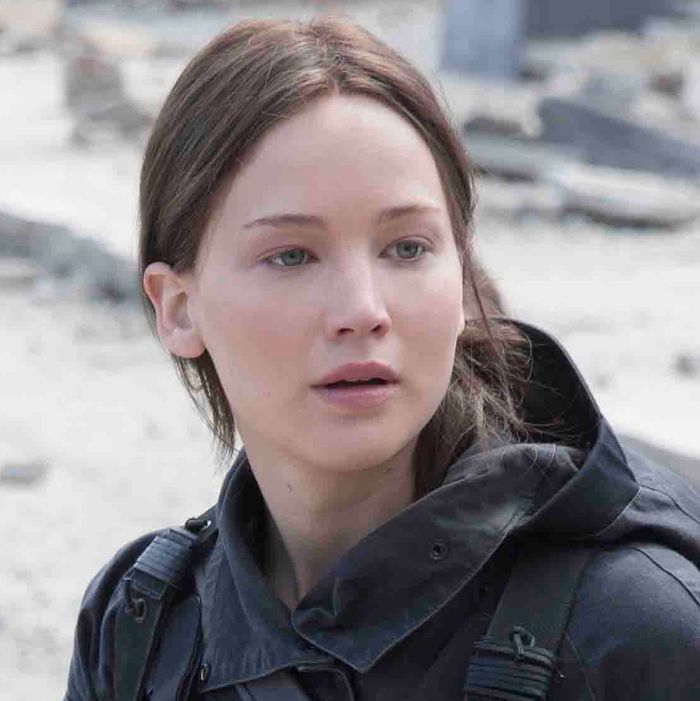Jennifer Lawrence the Hunger Games Mockingjay Part 2 Again
motion-picture show reviews
Jennifer Lawrence Thrills in The Hunger Games: Mockingjay — Function 2, a Strong Stop to the Franchise

Katniss, again bringing a bow to a gunfight. Photograph: Murray Close/Lionsgate
The final film accommodation of Suzanne Collins's dystopian Hunger Games YA novels, Mockingjay — Function 2, is a stiff antiwar saga: bleak, savage, and very modernistic in the depiction of an unholy union between political manipulation and showbiz. It's impressive — but then, The Hunger Games is made of finer stuff than the standard fanboy-bait studio "franchises." Possibly it's that a woman wrote the books (although a adult female also wrote the dumb, reactionary Divergent serial, so go figure). These are state of war movies in which no victory is orgasmic: There are no exploding Expiry Stars, no triumphal processions, no propagandistic symbols that aren't inherently suspect. All right, one climactic slaying has a satisfying thump, but otherwise, no one dies well. The heroine, Katniss Everdeen, is sickened by her warrior persona, the winged, black-clad "Mockingjay," which is used as an icon of the rebel brotherhood similar Delacroix's painting of "Liberty" leading the French people at the barricades. To Katniss, killing is obscene, the upshot of a malevolent land that holds power by pitting citizen confronting denizen — and, most notoriously, in the annual Hunger Games, kid against child.
Apart from adding a billion dollars to its coffers, Lionsgate had no reason to split Collins'south final book into two parts. ("Could there be a better reason?" yous ask.) Information technology takes a while for Mockingjay — Part 2 to recover the story's momentum. Information technology begins with Jennifer Lawrence'southward Katniss in close-up, getting a brace taken off her bruised neck — the effect of an assail by Peeta (Josh Hutcherson), the human being she loves and whose life she saved, now brainwashed into wanting to kill her. Even if you don't remember the end of Mockingjay — Role 1, the wait on Lawrence'due south face instantly establishes the overriding emotion: anguished incomprehension.
I can't imagine how this role could be played more vividly. Lawrence's performances in all four films — even the first, which was poorly directed past Gary Ross — have defenseless that distinctive "YA" element: the disconnect between Katniss's inner world and how she's seen by others. A film crew (led by Natalie Dormer) follows her into battle, broadcasting her moves in real fourth dimension to the beleaguered outlying districts, firing upwards the citizens for the fight against the Capitol, District 1, abode of a decadent elite and its mass-murderer president. But much of what Katniss does is strong, her every "heroic" gesture freighted with self-consciousness. Like Lawrence herself, Katniss can't play scenes she doesn't believe. And though she knows what she's fighting against — she thinks the mass-murdering President Snow (Donald Sutherland) is a fount of evil — she's not sure what she's fighting for. The president of the insubordinate alliance, Alma Coin, is played by Julianne Moore, with a white streak in her hair like Susan Sontag (or a skunk), and she's all tight smiles and bland, canned rhetoric. Behind the scenes, she coolly plots with her consultant, Plutarch Heavensbee (Philip Seymour Hoffman), to exploit the Mockingjay symbol for all its worth. Who's to say that the rebel leader is not President Snowfall'due south mirror image?
The director, Francis Lawrence, has a heavy bear on — merely this is heavy stuff. Exteriors consist of either the rubbled remains of what were once homes for homo beings or inhumanly huge squares that evoke Germany at its most fascistic. Ane long sequence takes identify in a sewer in which the only living things as well the rebels are monsters that wipe out half the cast. Absent is anything green, annihilation organic. The Capitol's super-capitalists have denuded the world.
Mockingjay suffers from two terrible casting decisions carried over from Ross'due south offset Hunger Games: Hutcherson, and Liam Hemsworth as Katniss's hunky beginning boyfriend, Gale. The old is actually improve than usual, hitting a couple of skillful, anguished notes as Peeta fights against his brainwashing. Just his acting is still small-scale. As for Hemsworth, he's hopeless; he makes a dull part duller. The love triangle doesn't upstage the real story — a war being fought with bombs, bullets, and symbols — only it'southward touch-and-go.
Mockingjay — Office two is all Lawrence, though a couple of others have their moments. Every bit a ravaged former political prisoner given to mocking the Mockingjay, Jena Malone is — as usual — delightfully twisted: She kicks every movie she's in into a queerer (in the onetime sense) gear. Embracing the hazard to be illiberal, Sutherland relishes every hammy piece of villainy, and though Julianne Moore doesn't ascension above the material, her implacable glassiness has its charm. She's the worst-case Hillary scenario.
The nigh problematic function is that of Philip Seymour Hoffman every bit the sly Heavensbee, not considering he isn't proficient but because he isn't at that place for the second half, having died in the centre of shooting. Lawrence edits in reaction shots taken from other scenes (or other movies?) and, at the cease, adds an obvious digital paradigm. Showbiz trickery, however powerful, can't yet reanimate the dead.
I'chiliad not slighting Mockingjay — Part 2 when I say that it ends less with a bang than a whimper. There's regrowth, but non enough — yet — to compensate for what's gone. I wish every war movie ended on a note of loss, and perhaps with more female person writer-directors on the horizon (excluding Kathryn Bigelow, who gives men penis envy), more than war movies volition. In the meantime, this is the rare superhero saga in which the hero isn't her true self until she tin shed her costume and alive in a world that has no need of symbols.
Source: https://www.vulture.com/2015/11/review-the-hunger-games-mockingjay-part-2.html
0 Response to "Jennifer Lawrence the Hunger Games Mockingjay Part 2 Again"
Post a Comment